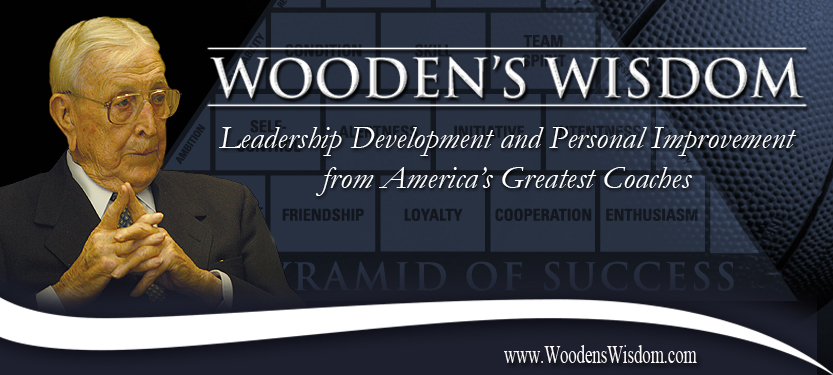 |
|
| Wooden's Wisdom - Volume 1 | Issue 13 |
| Craig Impelman Speaking | Championship Coaches | Champion's Leadership Library Login | |
|
HARD WORK
Click here to watch short Coach Wooden Video Clip When Coach Wooden coined his definition of success in 1934 (“Success is peace of mind which is a direct result of self-satisfaction in knowing you made the effort to do the best of which you are capable.“) his philosophy was clear: He had defined the goal for which he wanted his students to strive.

In 1934, when Coach Wooden began building his Pyramid of Success, he chose “Industriousness” as one of the cornerstones. While many other blocks were moved and redefined in the next 14 years the Pyramid developed, industriousness was never moved nor did its definition change: "There is no substitute for work. Worthwhile results come from hard work and careful planning."
Industriousness has two parts: work and planning. This issue will discuss work.
Coach Wooden understood the value of hard work growing up on a farm in Indiana. He rose early every morning before going to school to help milk the cows and do other chores required; when he arrived home from school there were always more chores to do as well as completing his homework. His father always required that the farm work and school work got done before any other activities.
“Nothing will work unless you do,” Coach often remarked later. It was a mantra by which he lived his life. The summer before his senior year in high school, Coach Wooden hitchhiked to Kansas to work in the wheat fields but when he arrived in Lawrence, he learned that the crop was not ready for harvest. With no harvesting job available, Coach got a job pouring concrete for the University’s new football stadium instead. He slept on the floor of the campus gymnasium.
While attending Purdue University and earning All-American honors three times for basketball, Coach Wooden also found time to publish and sell the official Purdue program. During football season, he worked in the training room helping to tape ankles in addition to helping paint the football stadium for 35 cents an hour.
During his first season as head basketball coach at UCLA, Coach Wooden worked from 6 AM until noon as a truck dispatcher for a local dairy company. Upon arriving on campus with his morning job completed, his first duty was to mop the gym floor so it would be ready for practice in the afternoon.
“There is no substitute for work,” he was fond of saying. “If you're looking for the easy way, the shortcut, the trick - you may get something done for a while, but it will not be lasting and you will not be developing your ability.”
And even after the basketball season ended each year, Coach Wooden didn’t coast off his team’s victories; he turned his mind to the next season. Asked once about his off-season regimen, Coach Wooden described in detail how he filled his downtime in coaching:
About two weeks after the season is over I would choose a basketball or coaching technique to research. It might be the fast-break, rebounding, the jump shot, free-throw shooting, defensive foot work, zone attack, zone defense; it might be anything. So about 2 to 3 weeks, no set time, after the season I would go through all the issues of Scholastic Coach and Athletic Journal and single out all articles on that topic. I’d also go through all the articles and books on basketball that I could find and concentrate on the selected topic.
Once I selected the appropriate literature I’d take ideas out of every one. Then I’d start a process of crossing out and making a composite list. Towards the end of summer I’d have a pretty good composite theme on the topic.
If someone has something that's been very good, let's say free-throw shooting, I’d try to talk to that individual and get further information as to his ideas. If some coach seemed to attack zones really well, I’d contact him. If all coaches agree on one thing, it must be pretty good. If someone has done real well in a specific area, why were they successful? I want to know. I did that for I'd say about 20 of my 27 years at UCLA. I took a different topic every year.
Throughout his life from the time he was a boy until his retirement from coaching, hard work was a cornerstone of not only Coach Wooden’s Pyramid of Success, but his own successful life.
"The harder you work, the more luck you will have" - John Wooden
Yours in coaching,
Craig Impelman www.woodenswisdom.com
Twitter: @woodenswisdom
|
HOW TO BE A CHAMPION
You Wonder How They Do It,
You Look to See the Knack,
You Watch the Foot in Action,
Or the Shoulder or the Back.
But When You Spot the Answer
Where the Higher Glamours Lurk,
You’ll Find in Moving Higher
Up the Laurel-Covered Spire,
That Most of It Is Practice,
And the Rest of It Is Work.
Grantland Rice |
|
For more information visit www.woodenswisdom.com |
|
© Copyright 2024 WoodensWisdom.com | # of Times Wooden's Wisdom Issues Opened: 6,737,269
Hosting & Design by:EverydayWebDesign.com